Do you want to know the secret of losing ‘Apologies for cross-posting’ from your life? It’s quite simple, you need to diversify your personal learning networks and ditch relying on mailing lists. Last year I was on a LIKE panel discussing experiences of personal learning networks. I thought I’d provide a reprise of what I covered and add in some reflections of what I’ve noted since then.
How did I come to personal learning networks and why?
I have always been a keen networker, and in analogue days a lot of my personal learning network took place on the phone, or face to face at AUKML (Association of UK Media Librarians) meetings and other conferences. That learning involved sharing stories and best practice, making connections, helping with problem solving. It was very much a give and take experience.
In the last 20 years I’ve moved from analogue to a personal learning network (PLN) using technology to share best practice; discuss and debate issues; make connections; keep in touch with issues across the profession; and to learn. But I do still appreciate the opportunities that attending face to face meetings enables. I often find the best way to develop relationships post conference is through social media.
I’ve used social media (Twitter, LinkedIn etc), email lists, internet and my network for work, for study and in the periods when I’ve been unemployed. At all times my PLN has been a source of great support and advice,
You have to be disciplined, and not constantly keep looking at social media. It’s best to schedule time, and stick to it, when you know you can fit in looking through social media. I’ve found it helpful to schedule time on the way to and from work and for short bursts at lunchtime. I tend to read and respond to tweets during this time.
My personal learning network has given me:
- the chance to get perspectives on issues and challenges from a variety of sectors. It has also made me realise that solutions from one sector can be adapted and used in another; thus reducing the number of times I’ve had to re-invent the wheel;
- speedy access to a range of people to help me with improving my professional practice e.g. in 1999 my SLA News division contacts facilitated visits to the then libraries at NY Times, Time magazine and ABC News, which provided valuable insight into the use of online services which I took back to the BBC;
- a diverse and constantly on tap current awareness service – putting listservs into obscurity – to keep me up to date on professional issues.
Two pieces of advice I’d give to somebody new to this?
a. Join Twitter, if you haven’t already and check out various chats: #UKlibchat; #UKmedlibs; #llrg; #interlibnet; #critlib; #slatalk; and follow people in your sector.
b. Schedule time to indulge in virtual networking, and drop some other things to fit in it. Bear in mind it will take time to develop links and network.
Reflections ..
During the panel discussions I realised I’d pretty much given up on LinkedIn, either as a source of information, or place to interact. I kept my profile up to date but didn’t regularly use the website. My views on this changed when I updated my profile following a new job on LinkedIn and Twitter. I was immediately inundated by notifications on Twitter, as I’d hoped and expected. I didn’t expect much from LinkedIn, but over a 3 week period I had messages from nearly 50 people. Proof that there is still life left in LinkedIn, and that there is value in re-connecting you to people.
I do now regularly look at LinkedIn for updates on people and as mechanism for ensuring I’m keeping up to date on issues in the sector. I find I get a good balance of learning from using Twitter and LinkedIn, plus of course attending networking events and conferences.
 I know it sounds improbable but I’ve been taking a ‘ballet for grown ups’ class since September last year. Needless to say I don’t look anything like this picture, but you get the idea.
I know it sounds improbable but I’ve been taking a ‘ballet for grown ups’ class since September last year. Needless to say I don’t look anything like this picture, but you get the idea.
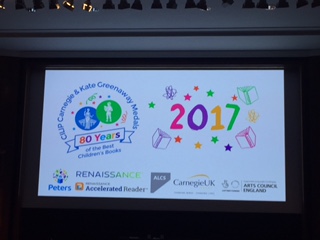 Medal
Medal 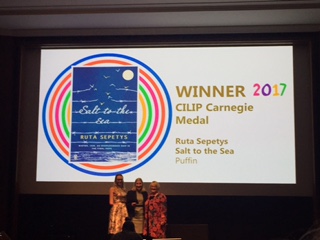 It was won by Ruta Sepetys with Salt to the Sea, a fictionalised account of the worst maritime disaster in history. I can vouch for what a sensational and evocative read this is.
It was won by Ruta Sepetys with Salt to the Sea, a fictionalised account of the worst maritime disaster in history. I can vouch for what a sensational and evocative read this is.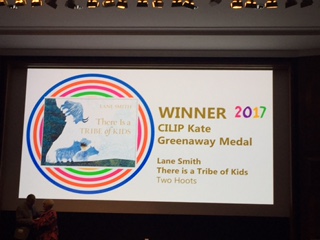
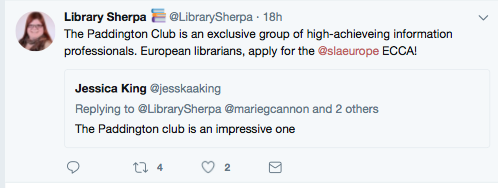

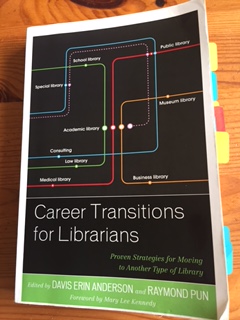 Transition for Librarians: Proven strategies for moving to another type of library.
Transition for Librarians: Proven strategies for moving to another type of library.